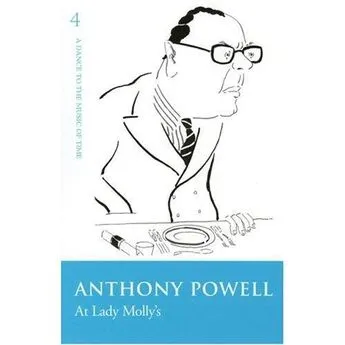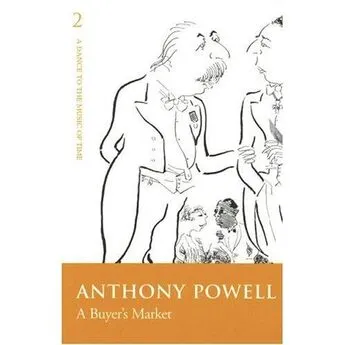Anthony Powell - At Lady Mollys
- Название:At Lady Mollys
- Автор:
- Жанр:
- Издательство:неизвестно
- Год:2005
- ISBN:нет данных
- Рейтинг:
- Избранное:Добавить в избранное
-
Отзывы:
-
Ваша оценка:
Anthony Powell - At Lady Mollys краткое содержание
A Dance to the Music of Time — his brilliant 12-novel sequence, which chronicles the lives of over three hundred characters, is a unique evocation of life in twentieth-century England.
The novels follow Nicholas Jenkins, Kenneth Widmerpool and others, as they negotiate the intellectual, cultural and social hurdles that stand between them and the “Acceptance World.”
At Lady Mollys - читать онлайн бесплатно полную версию (весь текст целиком)
Интервал:
Закладка:
‘No, I wasn’t too young. I saw the show as a schoolboy.’
The band had momentarily ceased its hubbub. Jeavons leant forward. I thought he had something further to say which he wished to run no danger of being overheard. Instead, he suddenly began to sing, quite loud and in an unexpectedly deep and attractive voice:
‘I could say such — wonderful things to you,
There would be such — wonderful things to do.
Taking this, perhaps not unnaturally, as a kind of summons, two of the girls at a neighbouring table rose and prepared to join us, a tall, muscular blonde, not altogether unlike Mona, and a small, plump brunette, who reminded me of a girl I used to know called Rosie Manasch. (Peter Templer liked to say that you could recognise all the girls you had ever met in a chorus: like picking out your friends from a flock of sheep.) Jeavons immediately checked this threatened incursion before it could take serious form by explaining that we were waiting for the ‘rest of the party’. The girls withdrew. Jeavons condnued the song as if there had been no interruption:
‘If you were the only — girl in the world,
And I was the only boy …’
He had only just time to finish before the band broke out again in a deafening volume of sound, playing some tune of very different tempo from that sung by Jeavons.
‘People don’t think the same way any longer,’ he bawled across the table. ‘The war blew the whole bloody thing up, like tossing a Mills bomb into a dug-out. Everything’s changed about all that. Always feel rather sorry for your generation as a matter of fact, not but what we haven’t all lost our — what do you call ’em — you know — somebody used the word in our house the other night — saying much what I’m saying now? Struck me very forcibly. You know — when you’re soft enough to think things are going to be a damned sight better than they turn out to be. What’s the word?’
‘Illusions?’
‘Illusions! That’s the one. We’ve lost all our bloody illusions. Put ’em all in the League of Nations, or somewhere like that. Illusions, my God. I had a few of ’em when I started. You wouldn’t believe it. Of course, I’ve been lucky. Lucky isn’t the word, as a matter of fact. Still people always talk as if marriage was one long roll in the hay. You can take it from me, my boy. it isn’t. You’ll be surprised when you get tied up to a woman yourself. Suppose I shouldn’t say such things. Molly and I are very fond of each other in our own way. Between you and me, she’s not a great one for bed. A chap I knew in the Ordnance, who’d carried on quite a bit with the girls, told me those noisy ones seldom are. Don’t do much in that line myself nowadays, to tell the truth. Feel too cooked most of the time. Never sure the army vets got quite all those separate pieces of a toffee-apple out of my ribs. Tickles a bit sometimes. Sull, you have to step out once in a way. Go melancholy mad otherwise. Life’s a rum business, however you look at it, and — as I was saying — not having been born to all this high life, and so on, I can’t exactly complain.’
It was clear to me now that, if Molly had had her day, so too in a sense had Jeavons, even though Jeavons’s day had not been at all the same as his wife’s: few days, indeed, could have been more different. He was one of those men, themselves not particularly aggressive in their relations with the opposite sex, who are at the same time peculiarly attractive to some women; and, accordingly, liable to be appropriated at short notice. The episode of Mildred Blaides illustrated this state of affairs, which was borne out by the story of his marriage. It was unlikely that these were the only two women in the course of his life who had decided to take charge of him. I was hoping for further reminiscences (though expecting none more extraordinary than that already retailed) when Dicky Umfraville himself arrived at our table.
Wearing a dinner jacket, Umfraville was otherwise unchanged from the night we had met at Foppa’s. Trim, horsey, perfecdy at ease with himself, and everyone around him, he managed at the same time to suggest the proximity of an abyss of scandal and bankruptcy threatening at any moment to engulf himself, and anyone else unfortunate enough to be within his immediate vicinity when the crash came. The charm he exercised over people was perhaps largely due to this ability to juggle with two contrasting, apparently contradictory attributes; the one, an underlying implication of sinister, disturbing undercurrents: the other, a soothing power to reassure and entertain. These incompatible elements were always to be felt warring with each other whenever he was present. He was like an actor who suddenly appears on the stage to the accompaniment of a roll of thunder, yet utterly captivates his audience a second later, while their nerves are still on edge, by crooning a sentimental song.
‘Why,’ he said, ‘this is a surprise. I never thought we should persuade you to come along here, Ted. Why didn’t you bring Molly with you? Are they treating you all right? I see they’ve brought you a bottle. Apply to me if there is any trouble. Would you like to meet any of the girls? They are not a bad crowd. I can’t imagine that you want anything of the sort.’
Jeavons did not answer. He barely acknowledged Umfraville’s greeting. Once more he was lost in thought. He had undoubtedly had a fair amount to drink. Umfraville was not at all put out by this reception. He pulled a chair up to the table and glanced across at me.
‘We’ve met before somewhere,’ he said.
‘At Foppa’s two or three years ago. You had just come back from Kenya. Hadn’t you been racing with Foppa?’
‘My God,’ said Umfraville, ‘I should think I do remember. Foppa and I had been to Caversham together. We are both interested in trotting races, which many people aren’t in this country. You came in with a very charming young woman, while Foppa and I were playing piquet. Then your friend Barnby appeared with Lady Anne Stepney — and before you could say Jack Robinson, the next thing I knew was that the Lady Anne had become my fourth wife.’
I laughed, wondering what he was going to say next. I knew that his marriage to Anne Stepney had lasted only a very short time.
‘I expect you heard that Anne and I didn’t manage to hit it off,’ he went on. ‘Charming child, but the fact was I was too old for her. She didn’t like grown-up life — and who shall blame her?’
He sighed.
‘I don’t like it much myself,’ he said.
‘Where is she now?’
I hardly knew whether the question was admissible. However, Umfraville had apparently achieved complete objectivity regarding his own life: certainly his matrimonial life.
‘Living in Paris,’ he said. ‘Doing some painting, you know. She was always tremendously keen on her painting. I fell rather short on that score too. Can’t tell a Sargent from a “Snaffles”. She shares a flat with a girl who also walked out on her husband the other day. Come on, Ted, you mustn’t go to sleep. I agree this place is pretty boring, but I can’t have it turned into a doss-house. Not for the first week or so, anyway.’
Jeavons came too with a jerk. He began to beat time thoughtfully on the table.
‘How are you doing here?’ he asked.
He spoke severely, as if he had come to audit the accounts. Umfraville shrugged’his shoulders.
‘Depends how people rally round,’ he said. ‘I don’t picture myself staying at this job long. Just enough to cover my most urgent needs — or rather my creditors’ most urgent needs. These joints have a brief vogue, if they’re lucky. We haven’t been open long enough yet to see how things are going. I lock upon your arrival, Ted, as a very good omen. Well, I suppose I must see everything about the place is going all right. Ought to have turned up earlier and done that already. I’ll look in again. By the way, Max Pilgrim and Heather Hopkins are coming in later to do a turn.’
He nodded to us, and moved away. People were now arriving in the club by twos and threes. The tables round us began to fill up. The girls lost some of their apathy. These newcomers offered little or no clue to the style of the place. They belonged to that anonymous, indistinct race of nightclub frequenters, as undifferentiated and lacking in individuality as the congregation at a funeral. None of them was in evening dress.
‘Rum bird, Umfraville,’ said Jeavons, thickly. ‘Don’t like him much. Knows everybody. Wasn’t a bit surprised when it turned out you’d met him before. Molly used to see quite a lot of him in the old days when he was a johnny about town.’
‘He married a girl much younger than himself as his fourth wife. They parted company, I hear.’
‘I know. The Bridgnorths’ second daughter,’ said Jeavons. ‘She has been to the house. Badly brought up. Been taken down a peg or two, I hope. Bad luck on Eddie Bridgnorth to have a girl like that. Done nothing to deserve it.’
Earlier in the evening, Jeavons had expressed only the vaguest knowledge of Umfraville’s last marriage. Now, he seemed familiar with all its essential aspects. His awareness seemed quite unpredictable from one moment to another. The compassionate tone in which he had named Lord Bridgnorth clearly voiced regret for a member of a caste rather than an individual, revealing for a split second a side of Jeavons on the whole concealed, though far more developed than might be supposed on brief acquaintance; the side, that is to say, which had by then entirely assimilated his wife’s social standpoint. Indeed, the words might have been uttered by Alfred Tolland, so conventional, yet at the same time so unaffected, was the reflection that Eddie Bridgnorth had done nothing to deserve a rackety daughter.
‘I think I’ll make a further inspection of these quarters,’ said Jeavons, rising. ‘Just as well to know your way about.’
He made at first towards the band, but a waiter redirected bim, and he disappeared through a small door. He was away a long time, during which two fresh elements were added to the composition of the room.
The first of these new components, a man and a woman, turned out to be Max Pilgrim and Heather Hopkins. They entered with the animation of professionals, almost as if their act had already begun, at once greeted by Umfraville who led them to a table near the band. I had never met Pilgrim, although I had more than once watched his performances at restaurants or cabarets, since that night, years before, when he had quarrelled so bitterly with poor Mr. Deacon at Mrs. Andriadis’s party. Tall and stooping, smiling through large spectacles, there was something mild and parsonic about his manner, as if he were apologising for having to draw peoples’ attention to their sins in so blatant a manner. He wore tails. Hopkins had cleaned herself up greatly since her application for the loan of an egg from Norah Tolland and Eleanor Walpole-Wilson. Her black coat and skirt, cut like a dinner jacket, had silk lapels above a stiff shirt, butterfly collar and black bow tie. Her silk stockings were black, too, and she wore a bracelet round her left ankle.
This couple had scarccly appeared when another, far less expected party came in, and were shown to a table evidently reserved for them. Mrs. Haycock led the way, followed by my old friend, Peter Templer; then Widmerpool, walking beside an unusually good-looking girl whose face I did not know. They were in evening dress. From the rather stiff way in which Templer carried himself, I guessed that he felt a shade self-conscious about the company he was keeping. By that time I was used to the idea that he no longer regarded Widmerpool with derision. After all, they did business together, and Widmerpool had helped Bob Duport to get a job. All the same, there remained something incongruous about finding Templer and Widmerpool embarked upon a partie carrée at a night club. Night clubs were so much to be regarded as Templer’s natural element, and so little Widmerpool’s, that there seemed even a kind of injustice that Widmerpool should in this manner be forced to operate in a field so inappropriate to himself; and, on top of that, for Templer to be covertly ashamed of his company.
Читать дальшеИнтервал:
Закладка:








